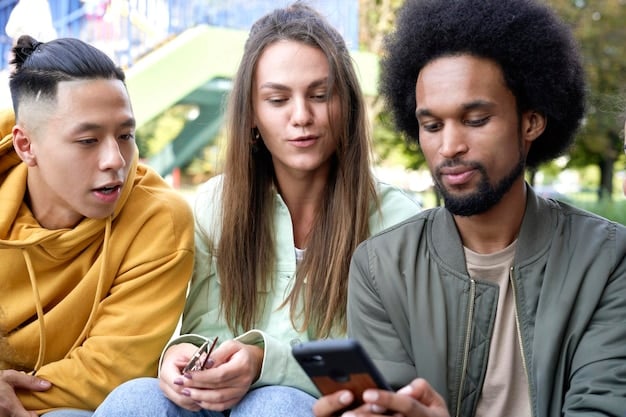Influencer Culture’s Impact: Teen Self-Esteem in the US

The rise of influencer culture significantly impacts the self-esteem of US teenagers by creating unrealistic standards of beauty, success, and lifestyle, leading to feelings of inadequacy and social comparison.
The digital age has ushered in the era of the influencer, and nowhere is its impact more keenly felt than among teenagers. The question of how the rise of influencer culture is impacting the self-esteem of US teenagers is now more relevant than ever. This article explores the multifaceted ways in which these digital figures shape the perceptions, aspirations, and self-worth of young people in the United States.
The pervasive reach of influencer culture
Influencer culture has become deeply ingrained in the lives of American teenagers. Social media platforms serve as the primary channel through which influencers disseminate their content, shaping trends, values, and aspirations. Understanding the extent of this reach is crucial to grasp its influence.
Social media as the new playground
For many teens, social media is more than just a platform; it’s their primary social environment. Influencers effectively become the role models, tastemakers, and arbiters of cool within these digital spaces.
Always-on connectivity: a double-edged sword
The constant connectivity amplifies the exposure to influencers, making it nearly impossible for teens to escape the curated realities presented online. This can lead to a distorted perception of reality and heightened social comparison.

- Increased exposure: Teens are constantly bombarded with influencer content.
- Normalization of unrealistic standards: What was once exceptional becomes the norm.
- Peer pressure: The desire to emulate influencers to fit in.
The pervasive reach of influencer culture underscores the urgent need to understand its effects on teenagers’ self-esteem. By becoming so deeply integrated into daily life, it creates new benchmarks for success and attractiveness, often unattainable for the average teen.
Unrealistic beauty standards and body image
One of the most prominent ways influencers impact teenage self-esteem is through the promotion of unrealistic beauty standards. These standards, often achieved through filters, cosmetic procedures, and carefully curated images, can lead to dissatisfaction with one’s own appearance.
The age of filters and enhancements
The widespread use of filters and digital enhancements creates a false sense of reality. Teens may feel pressured to achieve an unattainable level of physical perfection.
The pressure to conform to trends
Influencers often dictate beauty trends, leading to a constant pressure to conform. Teens may feel inadequate if they don’t possess the latest makeup, fashion, or body type deemed desirable.
Social media algorithms play a significant role by prioritizing content that aligns with narrow beauty standards. This creates an echo chamber where teens are repeatedly exposed to the same ideals, reinforcing their perceived shortcomings.
- Body dysmorphia: Increased risk of developing body image issues.
- Low self-esteem: Feeling unattractive or inadequate compared to influencers.
- Mental health impacts: Anxiety and depression related to appearance.
Addressing the promotion of unrealistic beauty standards requires a multi-faceted approach. Encouraging critical thinking, promoting media literacy, and celebrating diversity are essential steps in mitigating the negative impacts on teenage self-esteem.
The comparison trap: social media and self-worth
Social media inherently fosters comparison, and influencer culture exacerbates this tendency among teenagers. The constant exposure to seemingly perfect lives can lead to feelings of inadequacy and low self-worth. This comparison trap can have detrimental effects on mental health and overall well-being.
Curated lives vs. real lives
Influencers typically present a highly curated version of their lives, highlighting successes and minimizing struggles. This creates a distorted perception of reality and makes it easy for teens to fall into the comparison trap.
The impact of metrics: likes and followers
The emphasis on metrics like likes and followers amplifies the sense of competition and validation-seeking. Teens may equate their worth with their social media popularity, leading to feelings of anxiety and inadequacy.

The act of comparing oneself to others triggers a cascade of negative emotions, including envy, shame, and self-doubt. These emotions can erode self-esteem and contribute to mental health issues.
- Envy and resentment: Feeling bitter about others’ perceived success.
- Self-doubt and insecurity: Questioning one’s own abilities and worth.
- Mental health struggles: Increased risk of anxiety and depression.
Breaking free from the comparison trap requires conscious effort. Encouraging self-acceptance, practicing gratitude, and focusing on personal strengths are essential strategies for promoting self-worth and resilience.
Cyberbullying and online harassment
Influencer culture can also contribute to cyberbullying and online harassment, further damaging teenage self-esteem. The anonymity and reach of social media make it easy for bullies to target and harass others, often with devastating consequences.
The role of follower behavior
Influencers can inadvertently foster a toxic environment through their own behavior and the behavior of their followers. Negative comments, trolling, and online shaming can have a profound impact on teenage self-esteem.
The amplification of negativity
Social media algorithms can amplify negativity, making it seem more pervasive than it actually is. Teens may feel overwhelmed by the amount of hate and criticism they encounter online.
Experiences of cyberbullying and online harassment can lead to a range of emotional and psychological problems. Victims may experience anxiety, depression, low self-esteem, and even suicidal thoughts.
- Anxiety and fear: Feeling unsafe online and in real life.
- Depression and isolation: Withdrawing from social interactions.
- Suicidal ideation: In extreme cases, thoughts of self-harm.
Addressing cyberbullying and online harassment requires a collective effort. Platforms need to implement stronger safeguards, schools need to educate students about responsible online behavior, and parents need to monitor their children’s online activity.
The pursuit of validation and fame
Influencer culture often equates self-worth with validation and fame. Teens may feel pressured to seek external approval through likes, followers, and comments, leading to a fragile sense of self-esteem that is dependent on others’ opinions.
The allure of instant gratification
Social media offers the promise of instant gratification through likes and comments. Teens may become addicted to this validation, constantly seeking new ways to garner attention and approval.
The pitfalls of external validation
Relying on external validation can lead to a sense of emptiness and dissatisfaction. Teens may struggle to develop a strong sense of self if their worth is contingent on others’ opinions.
The constant pursuit of validation and fame can be exhausting and ultimately unfulfilling. Teens may sacrifice their authenticity and values in an attempt to conform to what they believe others want to see.
- Addiction to social media: Spending excessive time online seeking validation.
- Loss of authenticity: Presenting a false version of oneself.
- Emotional instability: Fluctuations in self-esteem based on online metrics.
Shifting the focus from external validation to intrinsic worth is crucial for building healthy self-esteem. Encouraging teens to pursue their passions, cultivate meaningful relationships, and develop a strong sense of self can help them resist the allure of fame and validation.
Strategies for mitigating the negative impacts
While influencer culture presents challenges to teenage self-esteem, there are strategies that can help mitigate the negative impacts. Promoting media literacy, encouraging critical thinking, and fostering self-acceptance are essential steps in empowering teens to navigate the digital world with confidence and resilience.
Promoting media literacy
Media literacy equips teens with the skills to critically evaluate the content they consume online. By understanding the techniques used to create and manipulate images, teens can develop a more realistic perspective on influencer culture.
Encouraging critical thinking
Critical thinking involves questioning the messages presented by influencers and considering alternative perspectives. This can help teens avoid blindly accepting unrealistic standards and expectations.
Fostering self-acceptance
Self-acceptance involves embracing one’s own unique qualities and imperfections. Encouraging teens to focus on their strengths and values can help them develop a strong sense of self-worth that is not dependent on external validation.
Parents, educators, and mentors can play a vital role in helping teens develop these skills. Open communication, supportive environments, and positive role models are essential for fostering resilience and self-esteem.
- Open communication: Creating a safe space for teens to express their feelings.
- Supportive environments: Building positive relationships and communities.
- Positive role models: Showcasing diverse individuals who embody self-acceptance.
By implementing these strategies, we can empower teenagers to navigate the complexities of influencer culture with confidence and resilience, safeguarding their self-esteem and promoting their overall well-being.
| Key Aspect | Brief Description |
|---|---|
| 🤳Unrealistic Standards | Influencers often promote unattainable beauty and lifestyle standards. |
| 🤔 Comparison Trap | Teens frequently compare their lives to the curated content of influencers, leading to dissatisfaction. |
| 🌐 Cyberbullying | The culture can contribute to online harassment, affecting self-esteem. |
| 👍 Validation Seeking | Teens may seek external approval through likes and followers, impacting their sense of self-worth. |
Frequently Asked Questions
Influencers often promote unrealistic beauty standards, leading teens to feel dissatisfied with their own bodies and appearances. This can contribute to body dysmorphia and low self-esteem.
Social media platforms amplify the reach of influencers, exposing teens to curated and often unattainable lifestyles and appearances. The comparison trap inherent in social media exacerbates feelings of inadequacy.
Parents can encourage media literacy, critical thinking, and open communication. Monitoring online activity and fostering a supportive environment can also help teens build resilience and self-esteem.
Signs include increased social media use, negative self-talk, anxiety about appearance, withdrawal from social activities, and a constant need for external validation through likes and followers.
Teens can seek out influencers who promote body positivity, mental health awareness, and self-acceptance. Look for individuals who value authenticity and substance over superficial metrics like followers.
Conclusion
In conclusion, the rise of influencer culture presents both opportunities and challenges for US teenagers. While influencers can inspire and entertain, their curated realities and promotion of unrealistic standards can negatively impact self-esteem. By fostering media literacy, encouraging critical thinking, and promoting self-acceptance, we can empower teens to navigate the digital world with confidence and resilience, safeguarding their mental health and well-being.





